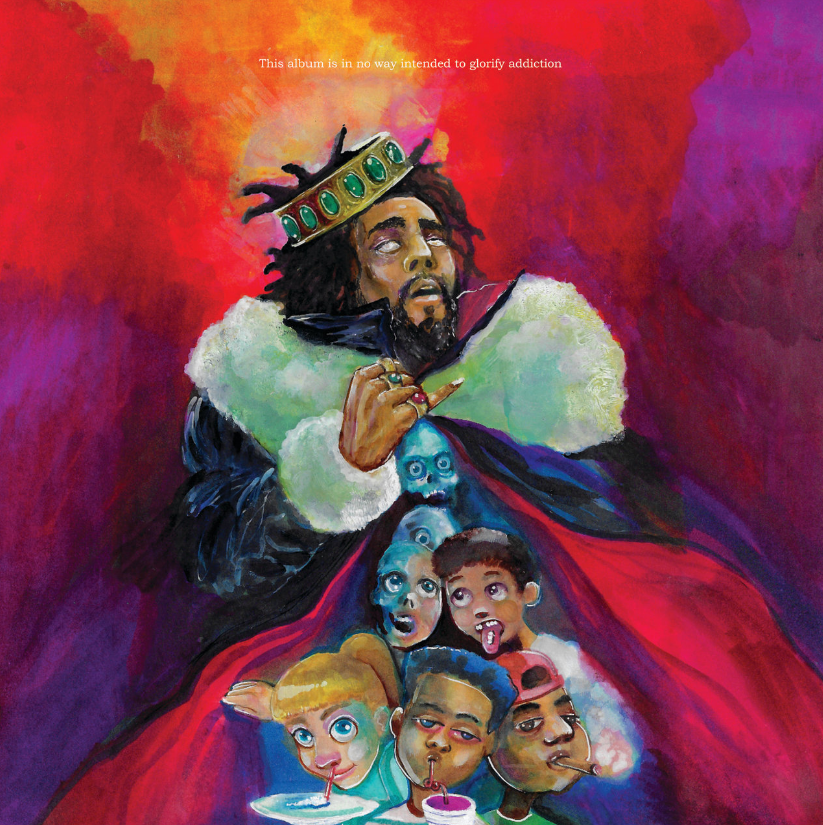From a young age, most of us are bombarded with Miss Othmar-styled messages cautioning us away from the Bad Things: drugs (D.A.R.E.), sex (run-of-the-mill sex education), the streets (G.R.E.A.T.). It seemed like sensible advice, but it was overly simplistic. Catchphrases can’t prepare anyone for the reality of how and why those pathways begin to seem like viable options; topics like generational trauma and poverty weren’t part of the lesson plans. J. Cole‘s fifth album KOD—Kids On Drugs, King Overdosed or Kill Our Demons, choose wisely—seeks to be a corrective.
Over the course of 42 minutes, Cole takes aim at the many ways a person can spiral. The habits laid out bear a loose resemblance to the capital vices—pride, greed, gluttony, sloth, lust, envy, and wrath. The seven deadly sins, as they’re called, are often linked to recovery; after all, it’s these qualities or a combination thereof that drive people to their most hollow places. But Cole also rails against drug use explicitly, painting pictures of humans where others have only found statistics. The result is an album that humanely surveys addiction, without exactly offering up any fixes.
A song like the heartbreaking “Once An Addict” interlude adds a face to the stories of children abandoned—emotionally and/or physically—by parents suffering from addiction. Over somber production, Cole depicts the helplessness of watching his mom succumb to alcoholism and the regret of being unable to save her: “Little did I know how deep her sadness would go / Looking back, I wish I would’ve did more instead of runnin’,” he concludes at the end of his verse. “FRIENDS,” which immediately follows, offers bits of nuance about what can compel people to use in the first place from depression and broken families to lack of opportunity—even if his solution to “meditate, don’t medicate” is naïve at best.
Several of the songs on KOD are pitch-shifted in a way that often makes Cole’s voice barely recognizable. Like spiking the candy bowl with medicine, he adapts the stylistic tics—triplets and trap drums, mostly—of so-called mumble and Soundcloud rappers, many of whom revel in the vices he’s denouncing. “ATM” and its Hype Williams-styled video is perhaps the best example. Complete with a hyper-repetitive chorus, he satirizes capitalistic greed with the bluster of a club banger. (Surely, there will be someone who makes it rain in the real KOD with Cole chanting “count it up” in the background.) “Motiv8” with its rumbling West Coast bass and “Get Money” sample works to similar effect.
Elsewhere, the well-timed “Photograph” renders lust as it plays out on social media when the object of affection is a complete stranger, while “Kevin’s Heart” likens chemical highs to infidelity. “All a nigga know is how to fuck a good thing up,” he confesses on the latter track, with the title, of course, being play on comedian Kevin Hart’s highly publicized flings. Wrath shows up in “The Cut Off” and once more on closer “1985 (Intro to ‘The Fall Off’),” which positions Cole as rap OG, doling out advice to the younger generation. He doesn’t name names, but he casts his net wide (though that didn’t stop hit dogs from hollering). The song makes for good gossip fodder, but it leaves a sort of bittersweet taste in your mouth—pretentious and scathing, but not void of valid points.
KOD stumbles in its failure to offer any plausible alternatives to the behaviors it critiques, and maybe that’s because there aren’t any—at least not ones that would fit within the space of an album. There are hints and suggestions, like the redirecting of tax dollars on “Bracket” or police reform on “FRIENDS,” but those moments are insufficient and fleeting. Still, it’s a commendable effort, with Cole putting himself in a creative territory to respond to critics, peers and progeny. His messages are timely despite the fact that they continue, rather than conclude, a larger conversation. With issues that run much deeper than mumble raps and sobriety, KOD is a stark reminder that some of life’s most destructive elements don’t always come with a warning label.





